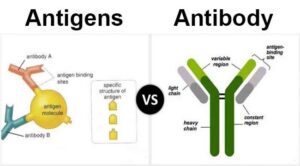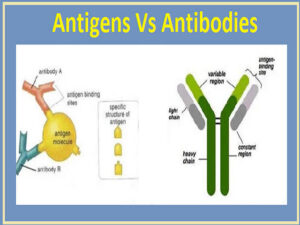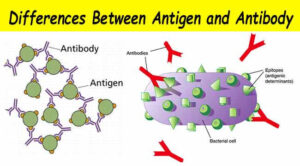Back to: MICROBIOLOGY 100 LEVEL
Welcome to class!
You’ve been doing brilliantly so far—your dedication to learning is truly inspiring! Today, we’re going to talk about something your immune system uses to protect you every day, even without your noticing. These two terms—antigens and antibodies—are at the heart of how your body recognises and fights disease. Once you understand how they work, you’ll have a much clearer picture of how your body keeps you safe from harmful invaders.
Antigens And Antibodies
Let’s think of your immune system like a team of security guards. They need to know who is allowed in and who should be stopped. Antigens are like the unique ID cards of every foreign substance that enters your body. Antibodies are the trained guards that recognise and attack any invader with the wrong ID.

What Are Antigens?
An antigen is any substance that can trigger an immune response in the body. It is usually found on the surface of pathogens like bacteria, viruses, fungi, or even toxins. Antigens can also be found on foreign cells during a blood transfusion or organ transplant.
Key features of antigens:
They are often proteins or polysaccharides.
They are foreign to the body.
The immune system recognises them as threats.
Each antigen has a unique structure or shape, like a fingerprint.
Example: The spike protein on the surface of the COVID-19 virus is an antigen. When your body detects it, it begins to build a defence.

What Are Antibodies?
Antibodies, also called immunoglobulins, are special proteins produced by B cells in your immune system. They are shaped like the letter Y, and their job is to recognise, bind to, and help destroy antigens.
Key features of antibodies:
They are specific—each antibody recognises one unique antigen.
They bind to antigens and neutralise them.
They can also mark pathogens so other immune cells can attack them.
Once produced, they stay in your system as part of immune memory.
Types of antibodies include:
IgG – the most common, provides long-term protection.
IgA – found in mucous membranes.
IgM – the first to respond during an infection.
IgE – involved in allergic reactions.
IgD – helps B cells become activated.
How Antigens and Antibodies Work Together

Imagine you’re vaccinated. The vaccine contains a harmless version of an antigen. Your body responds by making antibodies. Later, if the real pathogen enters your body, the antibodies quickly recognise the antigen and destroy the invader before it causes illness. This is how immunity works.
Summary
- Antigens are foreign substances (like proteins on pathogens) that trigger an immune response.
- Antibodies are proteins made by B cells that specifically recognise and bind to antigens.
- Each antibody matches one specific antigen—like a lock and key.
- Antibodies help neutralise or destroy harmful invaders in the body.
- The antigen-antibody interaction is central to immunity, vaccines, and fighting infections.
Evaluation
- What is an antigen, and what is its role in the immune system?
- How do antibodies help protect the body from disease?
- Which cells in the body produce antibodies?
- What happens when an antibody binds to an antigen?
By learning about antigens and antibodies, you now understand a major part of how vaccines, blood tests, and immune defence work. Keep this knowledge close—it’s powerful and practical. Afrilearn is cheering you on as you continue to grow. Let’s keep building your brilliance—see you in the next class!
